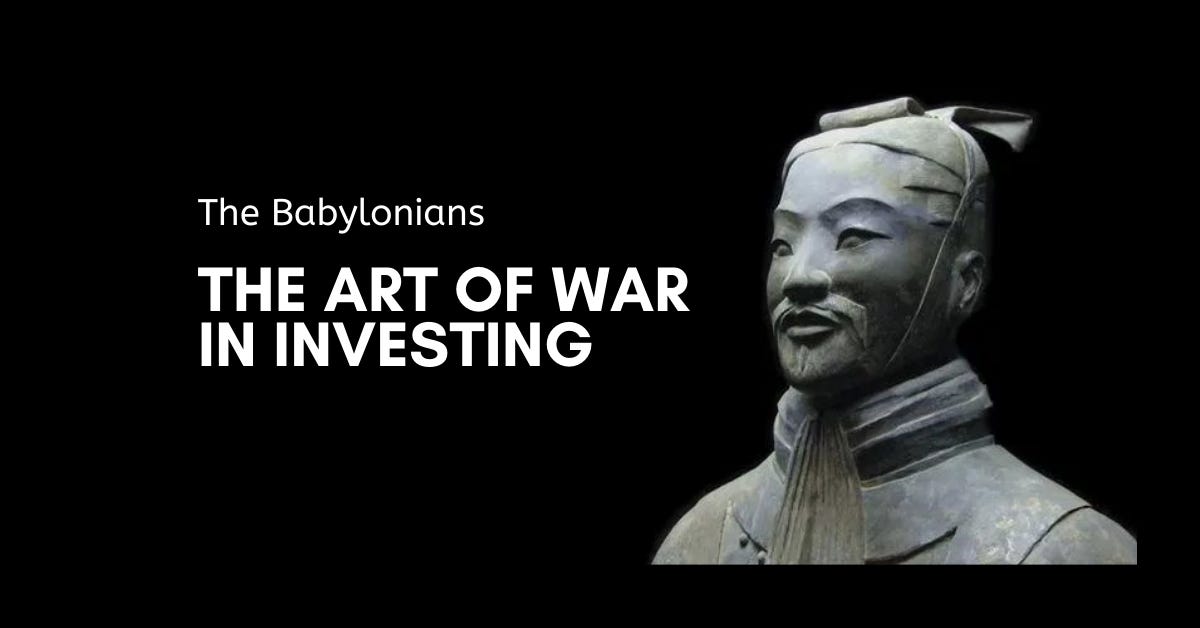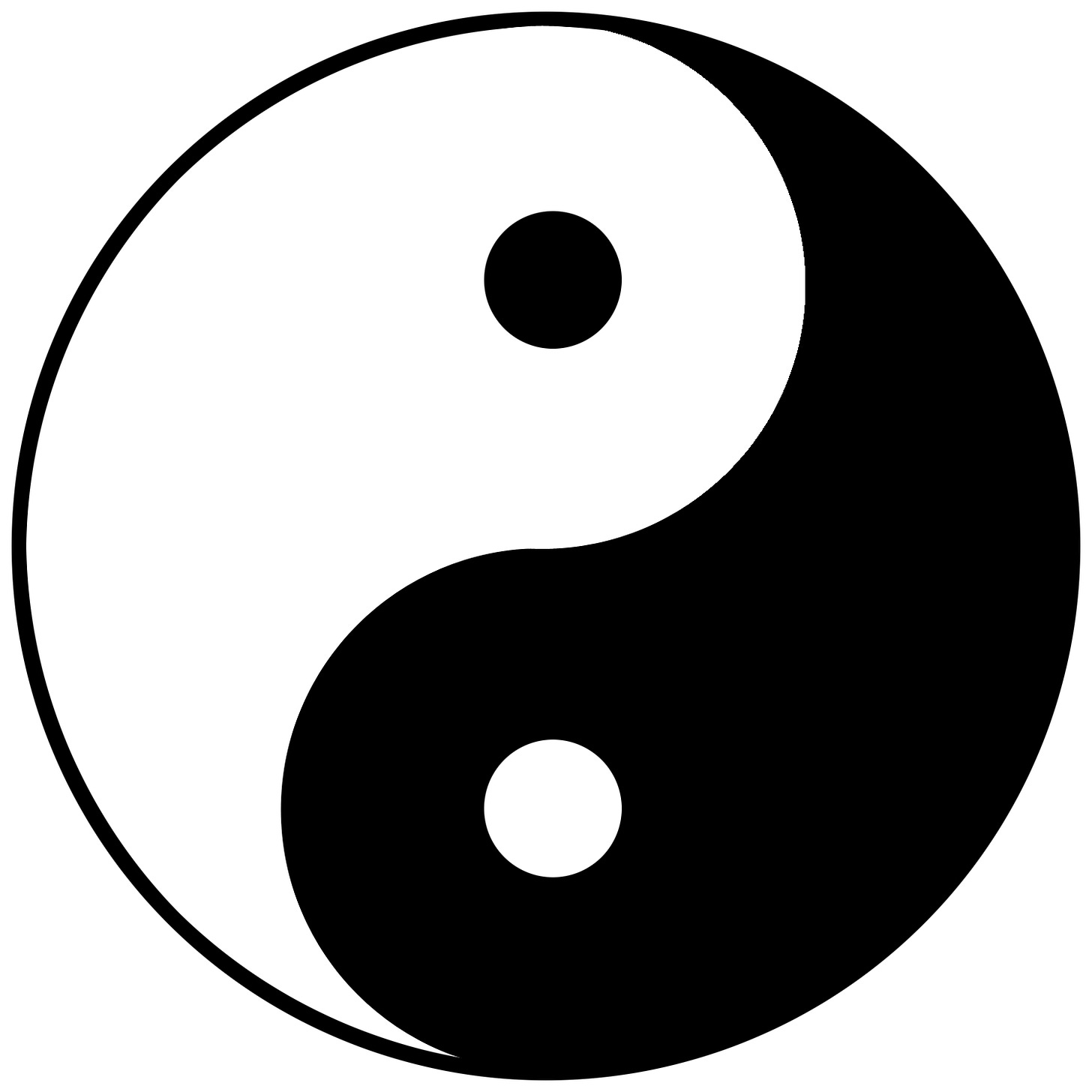The Art of War in Investing
1. Investing is a Game
Sun Tzu said: The art of war is of vital importance to the State. It is a matter of life and death, a road either to safety or to ruin. Hence it is a subject of inquiry that can on no account be neglected.
I like to see investing as a game. The objective is to build an empire as strong and lasting as the Romans and the Ottomans.
The job of a ruler is to make do with what you have, expand your territory, and grow your influence.
Cao Cao and Liu Bei also started from nothing. One left Luoyang to build his own army while the other was just a mere sandal-maker. But they are quick-witted, resourceful, and crafty, an essential skill in the art of war. Both eventually rose to prominence with their military genius and strategic thinking.
Doesn't matter how big or small are you. The process is more important than the goal. Progress is better than perfection.
In Sun Tzu's words: The control of a large force is the same principle as the control of a few men: it is merely a question of dividing up their numbers. Great results can be achieved with small forces.
Fighting with a large army under your command is nowise different from fighting with a small one: it is merely a question of instituting signs and signals.
2. Tactical Dispositions
In an empire, you have both offense and defense.
Offense deals with external affairs. This is about building a strong army, coming up with military plans, conquering other lands, and securing strategic locations.
Defense deals with internal affairs. This is about the finances of your state. Does your treasury have a sufficient budget to pull through bad times? Do you have walls of Babylon, strong and high enough to defend against unexpected invasions (medical bills)?
Every dollar represents a soldier under your command.
The bigger your army, the stronger your state.
Hence, how you allocate and utilize your army and resources is of paramount importance to the state.
The first task is to think about the allocation of your army between defense and offense. How many should be placed at the inner palace and outer gates as guards? This would be your emergency funds.
And how many should be placed at the frontline ready to conquer lands? This would be your war chest. Lands refer to assets like stocks, crypto, and properties in this case.
Lands conquered would give you additional soldiers and resources (dividends). As your army size grows, you can conquer bigger lands with bigger resources and so on. (Effects of compounding interest)
Those who leave their money in the banks and do nothing about it are 100% defense. You can be sure that they can weather any unexpected crisis. But their state won't be growing and expanding. It is the case of nothing ventured, nothing gained.
These are guards that would soon grow to become lazy and idle. Money loves activity and detests staleness. You have to put them into action to bring the very best out of them.
Even if you have allocated your soldiers to the front line, it does not necessarily mean it is a better decision. A person with 100% defense is better off than someone who lost military campaigns one after another, especially in an environment where no lands are conquerable.
A person who does nothing with his money is better than someone who lost it through investments.
In Paul Tudor Jones's words, “The most important rule of trading is to play great defense, not great offense.”
Nevertheless, it is important to note that keeping one's own state intact should be the primary importance. Crushing the enemy's state is secondary. Don’t blow up your account and lose the game entirely.
3. Weak Points & Strong
In the art of war, there is also the concept of weak points and strong points.
“So in war, the way is to avoid what is strong and to strike at what is weak.”
The Art of War, Sun Tzu
When stock prices and valuations are sky-high, it would be unwise to send your army and attack strong points. If you do, you have been baited by the enemy. It will cost you a lot more resources, and that would be a mistake. The more you lose, the harder it is to recoup back the losses. The unnecessary lives of soldiers would be lost under your command.
“The Wise warrior avoids the battle.”
The Art of War, Sun Tzu
A clever general, therefore, avoids an army when its spirit is keen, but attacks it when it is sluggish and inclined to return. This is the art of studying moods.
Similarly, markets have moods. Sometimes they are exuberant and sometimes they are fearful. Do not attack them when their spirit is keen.
You have to use them wisely and efficiently. Move not unless you see an advantage; use not your troops unless there is something to be gained; fight not unless the position is critical.
4. Heaven (天) - Yin and Yang
There are five constant factors in the art of war, one of which is heaven. Heaven is the concept of dualism. The yin and yang, cold and hot, night and day, times and season, crisis and opportunities.
When markets are good, we are in Yang territory (the white space). When markets are bad, we are in Yin territory (black space). At the peak of a bull cycle, a black dot emerges, signifying a transition into Yin. Likewise, in the deep abyss of a bear market, there will always be a light of hope as it transitions into Yang territory.
It is foolish to think that markets will stay in a territory forever, it is fluid & dynamic.
“Therefore, just as water retains no constant shape, so in warfare there are no constant conditions.”
The Art of War, Sun Tzu
Heaven dictates the investment climate which affects the tactical allocation of offense and defense. While no one can predict precisely the pivotal moment of a bull or bear cycle, we can get a rough sensing of it and act accordingly to it.
5. Commander (將) - How to wage a war
“There are five dangerous faults that may affect a general: (1) Recklessness, which leads to destruction; (2) cowardice, which leads to capture; (3) a hasty temper, which can be provoked by insults; ...”
The Art of War, Sun Tzu
Don’t be reckless in investing, and don’t be too fearful when there are opportunities in chaos. Finally, control your emotions and temper when the price moves against you, every possible consequence should be planned out deliberately beforehand and not be a surprise to you.
“It is the unemotional, reserved, calm, detached warrior who wins, not the hothead seeking vengeance and not the ambitious seeker of fortune.” ― Sun Tzu, The Art of War
The Art of War, Sun Tzu
Those who have an army on the frontline, knowing when to attack and where to attack would also determine the success of the general. You must plan before you strike.
Now the general who wins a battle makes many calculations in his temple ere the battle is fought. The general who loses a battle makes but few calculations beforehand. Thus do many calculations lead to victory, and few calculations to defeat: how much more no calculation at all! It is by attention to this point that I can foresee who is likely to win or lose.
The Art of War, Sun Tzu
Calculations refer to the research and valuation assumptions you make behind the scenes. The more work you have done, the more confident your decisions will be.
“Do not repeat the tactics which have gained you one victory, but let your methods be regulated by the infinite variety of circumstances.”
The Art of War, Sun Tzu
Don’t fall for the confidence bias as well. Your victories in the past may not be applicable and relevant to the conditions in the future. The circumstances of the markets are fluid and dynamic, and so should your strategy and methods.
Stick to your circle of competency when attacking and don’t over-diversify.
“If he sends reinforcements everywhere, he will everywhere be weak.”
The Art of War, Sun Tzu
We are not fit to lead an army on the march unless we are familiar with the face of the country—its mountains and forests, its pitfalls and precipices, its marshes and swamps.
Know all your competitors, mechanism loopholes, potential black-swan events, and reflexivity risks, and monitor them very closely especially if your allocation is big. Retreat your army if you sense, hear, or saw danger ahead or risk your entire legion if you are unfamiliar with the territory you are conquering.
Finally, the all-in-one encompassing quote, to conclude the Art of war in investing, Move swiftly as the Wind and closely formed as the Wood. Attack like the Fire and be still as the Mountain.





